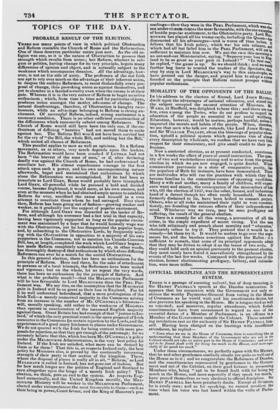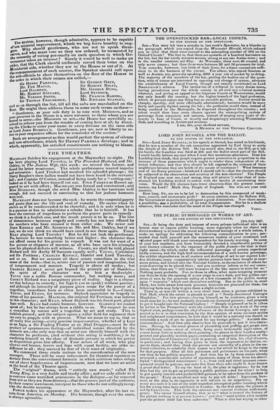OFFICIAL DISCIPLINE AND THE REPRESENTATIVE SYSTEM.
THERE is a passage of amusing naivet6, but of deep meaning, in Sir HENRY PARNELL'S speech at the Dundee nomination. It appears that his connexion with the Government not only re- strains the worthy Paymaster-General from voting in the House of Commons as he would wish and his constituents desire, but also prevents his speaking in the House. He is tongue-tied as well as vote-tied; and moreover, regular attendance, which foolish constituencies have been accustomed to regard as one of the essential duties of a Member of Parliament, is an offence in a Member of the Government outside the Cabinet. These astound- ing revelations rest on the authority of Sir HENRY PARNELL him- self. Having been charged on the hustings with insufficient attendance, he replied- ' a Even when we are in the House of Commons, there is something like an understanding that those !Members of the Government who are not in the Cabinet should not take an active part in the House of Commons; and we are apt to be found fault with for being too much in the House, and more espe- cial! y if we speak too much." Under these circumstances, we perfectly agree with Sir HENRY, that he and other gentlemen similarly situate are quite as well outof the House as in it ; and we congratulate the Reformers of Dundee, and the constituencies represented by gentlemen in the Govern- ment and out of the Cabinet, on their good fortune in possessing Members who, being " apt to be found fault with for being too much in the House, and more especially if they speak too much, have proved themselves so very obedient to official discipline. Sir HENRY PARNELL has been peculiarly docile. Except at divisjons, he is rarely seen; and as for speaking, we cannot recollect the time when his voice was last heard within the walls of Parlia- ment. The system, however, though admirable, appears to be capable crone material improvement, which we beg leave humbly to sug- gest. Why should gentlemen, who are not to speak them- Ives, and who must vote as they are ordered, be tormented by the necessity of voting personally on each question in which Go- vernment takes an interest' Surely it would be well to make an order, that the Clerk should uniformly record their votes on the Ministerial side, whether they are in the House or out of it. At the commencement or each session, the Speaker should call upon the sub-officials to show themselves on the door of the House in the order in which their names are called,—
Sir HENRY PARNELL, Sir GEORGE GREY, Sir ROBERT ROLFE, Mr. Fox MAULE, Lord DALMENY, Mr. GEORGE BYNG, Mr. ROBERT STEUART, Lord SEYMOUR,
Mr. VERNON SMITH, Mr. FRANCIS BARING,
Sir THOMAS TROUBRIDGE, Mr. EDWARD STANLEY, and so on through the list, till al the subs are marshalled on the floor. He might then address them in some such terms as these- ,. Gentlemen, as your sole duty is to vote with Ministers, and as your presence in the House is a mere nuisance to those whom you are bound to serve—the Ministers to wit—the House has mercifully re- solved to relieve you from the trouble of coming here at all, by direct- ing the Clerks to enter your name in every division on the same side as Lord JOHN RUSSELL'S. Gentlemen, you are now at liberty to re- tire to your respective offices for the remainder of the session." Such an arrangement as this would perfect the system of silence and non-attendance, which Sir HENRY PARNELL develops; and in which, apparently, his satisfied constituents see nothing to blame.



























 Previous page
Previous page